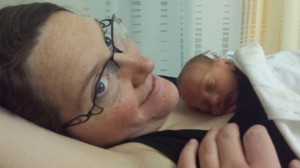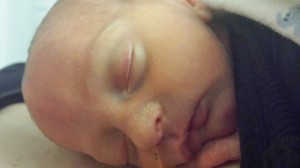… but this time it’s self-imposed.
I woke up for our early morning feeding yesterday with pain and hardness in my right breast. Not particularly surprising considering I’d been sleeping on my right side and we’d gone longer than normal between feedings.
I put Tirzah Mae to the breast and we breastfed for two hours. But instead of feeling better by the time we were done, I was feeling worse. Not only was I exhausted, I’d started shaking uncontrollably and the pain was bad enough that I couldn’t change positions.
By then, there wasn’t a question in my mind. I was sure I had mastitis. But on a Sunday morning, what is one to do?
I hung out on the couch, breastfeeding on the affected side first every two hours and sleeping while Daniel took Tirzah Mae in between.
When I was sure my sister would be home from church, I texted her seeking sympathy. She concurred with my self- diagnosis, offered sympathy, and ordered me to the doctor for antibiotics.
I’d been planning to call first thing Monday morning – the last time we went to urgent care on a Sunday, we waited 4 hours. Neither Tirzah Mae nor I could go that long without breastfeeding – and I didn’t relish exposing Tirzah Mae to a waiting room full of sick people for four hours. I texted and then called my sister to explain my predicament. She agreed that it was a tough one but couldn’t in good conscience recommend anything but that I start antibiotics immediately.
We went to urgent care.
The receptionist asked what I was there for – I confidently told her that I had mastitis. She asked if I’d been diagnosed, and Daniel’s voice beside me answered “self”. He’d come in unbeknownst to me from parking the car. I tried to defend myself – “and by my PA sister”. In my head, I was pleading, “I’m not one of those I-Googled-it self-diagnosers. I know what I’m talking about.” But really, it wasn’t important.
We waited maybe 15 minutes before I was called back for vitals. My temperature was just 99.4 “Great,” I thought, “now they’ll just think it’s a clogged duct. My sister sent me here for antibiotics and they won’t give them to me.” But then I was back in the waiting room.
Daniel read. I held Tirzah Mae. I nursed Tirzah Mae. I tried to relax the legs that were starting to tremble. Tirzah Mae started to fuss. I stood up and she calmed, but then the room started to sway. I asked Daniel to take Tirzah Mae. He did and tried to strike up a conversation – but my energy was completely focused on enduring. Nothing was left for conversation.
After an interminable wait, they called my name. They took me back to the exam room where I waited again. This time, it was only for a short while before the doctor walked in. I gave a brief history, explained apologetically that my temperature had been higher when I’d taken it at home. She brushed aside my explanation – “That temperature was just a point in time – and the hot and cold and shakiness and achiness you’ve described is consistent with fever.” She did a quick exam. “I think you do have mastitis,” she confirmed.
She instructed me to not quit breastfeeding (yay for doctors who follow best practices – there was a time not too long ago where physicians encouraged quitting – or at least pumping and dumping – for mastitis.) She encouraged me to try to empty that breast at each feeding. She gave me the okay to use Tylenol to manage the pain and fever. And she prescribed me an antibiotic.
I put myself on bedrest.
The only time I’ve felt worse is the day before we delivered Tirzah Mae – the day I felt so weak and awful that I gave up on the vaginal delivery I’d dreamed of practically my whole life. Thankfully, the Tylenol has worked wonders (as long as I take it consistently every four hours.)
I’m not going to try to be heroic with this one. I’m going to focus my efforts on getting better. Which means Tirzah Mae and I are staying in bed and breastfeeding frequently. I’m getting out to go to the bathroom, change her diaper, and get food. That’s it.
‘Cause I’m gonna get better, darn it, and I’m going to get better QUICKLY!


